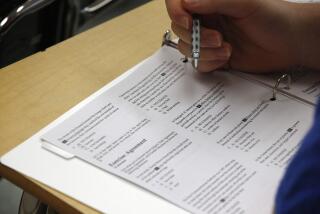USC Pilot Project Will Customize College Textbooks
- Share via
A technological revolution is brewing on college campuses. And if the insurgents win, the venerable college textbook, as well as the traditional campus bookstore, will be forever changed.
Textbook publishers are offering new computer and printing systems that allow professors to custom-design textbooks by handpicking course materials from electronic databases stocked with traditional textbooks, magazine articles and other published information. These customized books can be printed in limited quantities by the campus bookstore and distributed to students, sometimes within hours--not weeks or months--after ordering.
The first of these systems nationwide, to be operated at USC in partnership with McGraw-Hill, is to be announced this morning on the Los Angeles campus. During the three-year partnership, USC and McGraw-Hill, the nation’s second-largest college textbook publisher, will also develop new electronic course materials and explore ways to link the customized publishing system to an electronic library under development at the university.
USC’s first customized textbooks are scheduled to roll off the campus bookstore’s new presses next January. Although just a few books--including business and law texts--will be available initially for customization, university officials said they expect dozens of professors to participate in the program for the fall, 1991, semester.
“This is a real revolution in how we deliver the textbook to the student,” said Carl Tyson, president of McGraw-Hill’s college textbook division. “We have been talking about doing this for 20 years, but this is the first real step.”
With the USC pilot project, McGraw-Hill is taking the early lead in a battle to bring new computer and publishing technology to the $2-billion-per-year college text market. If the experiment succeeds at the university level, publishers say, it will be only a matter of time before elementary and secondary schools are offered textbook customizing services.
Customized teaching materials are nothing new, particularly on campus, where professors have long created anthologies of printed materials for their classes. But with advances in computers, databases and printing, professors have access to a greatly expanded range of materials, allowing them to put their personal stamp on their curriculum through creative packaging of course readings.
The new technology is particularly important in fast-moving fields such as law and science, where developments can render portions of textbooks outdated overnight.
The new technology also could permanently alter the role of the traditional campus bookstore.
After years of losing business to the copy shops that ring a campus, bookstores can fight back by getting into publishing and, perhaps, eventually into managing on-line database services.
Kenneth Green, a senior researcher at USC’s Center for Scholarly Technology, said students and professors will some day dial up texts and other software data from personal computers on campus and in their dormitory room, bypassing the bookstore entirely. However, the bookstore’s role would be to manage the computer systems and keep track of student usage and charges.
Already at USC, students are issued magnetic-tape-encoded identification badges that can be used as “debit cards” to pay for purchases at the bookstore and campus eateries. Green envisions that students would use these same cards to gain access and pay for services at the university’s new electronic library and database.
McGraw-Hill isn’t alone. Simon & Schuster, the nation’s largest textbook publisher, and Follett Corp., the nation’s largest operator of college bookstores, are working together to print customized textbooks.
McGraw-Hill said the new customized textbooks can be a bargain for students because professors will typically only want to reprint a portion of the traditional textbook, and prices will be based on the amount actually inserted into the customized version. For example, the first book in McGraw-Hill’s project, an accounting text by Robert and Walter Meigs, usually costs $43.95. But the first customized versions have included only a fraction of the text and cost far less.
Because McGraw-Hill also pays royalties to authors based on the amount reprinted, authors--particularly those of widely used introductory texts--could find their royalty checks shrinking as professors use only part of their tomes.
More to Read
Sign up for Essential California
The most important California stories and recommendations in your inbox every morning.
You may occasionally receive promotional content from the Los Angeles Times.












